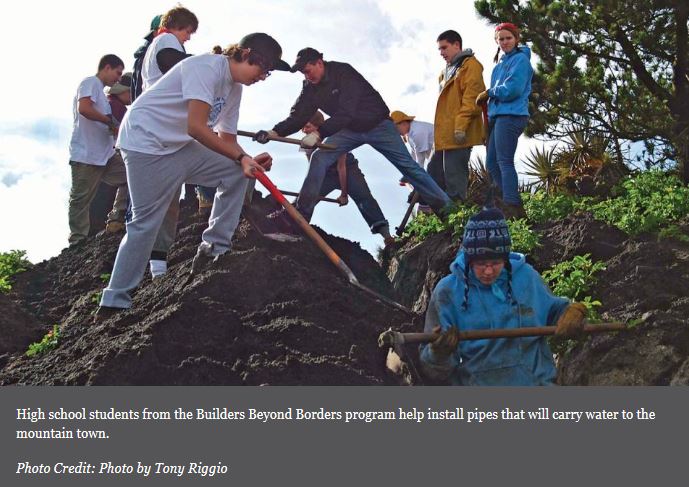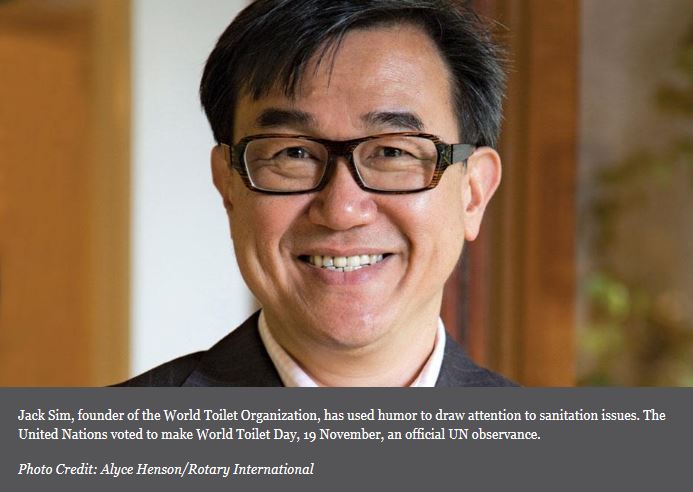* Water and Sanitation Month

Perched in the rugged mountains of central Ecuador, the village of Tingo Pucará seems an unlikely place for artistic inspiration to strike. But Tony Riggio never leaves his camera behind—and his photos of Tingo Pucará illustrate what can happen when Rotary members and young people team up on a water project.
Riggio has been leading youth expeditions to Central and South America since 2001, when his daughter participated in a program of Builders Beyond Borders (B3), a nonprofit based in Connecticut, USA. Construction projects have included hurricane shelters in the Dominican Republic, bridges in Nicaragua, and classrooms in Costa Rica. Water and sanitation are always primary components.
“People don’t believe what you tell them sometimes—that things are how they are in parts of Central and South America,” says Riggio, a member of the Rotary Club of Westport. “Water is such a precious commodity.”
In April 2011, Riggio traveled to Tingo Pucará—one of five B3 project sites across Ecuador that season—to build pipelines in a joint effort with the Peace Corps and Engineers Without Borders. The village stands at an altitude of 12,600 feet, with the nearest spring about 4,900 feet down a steep path.
Historically, faced with a lack of potable water and arable land, the men of Tingo Pucará have headed to the lowlands to find work, leaving the women to transport water for cooking, washing, and drinking. Before the project was completed, the 26 village families had as little as 15 minutes of running water per month, sent from a neighboring area when available.
The engineers designed a pumping system to draw water from the spring-fed stream, and the B3 team, made up of high school students and adult advisers, worked with locals to install the pipes, which now bring running water to homes.
“For our kids, that project was not very rewarding–until the last day, when we got to turn the water on,” says Amy Schroeder-Riggio, executive director of Builders Beyond Borders and Riggio’s wife. “When you’re doing a water project, you are laying the pipe, you’re covering it over, and it doesn’t even look like you were there. But when they turn the water on and everybody’s crying, it’s an incredible moment.”
Collaborating with the worldwide networks of the Peace Corps and Rotary boosts credibility and facilitates relationships, Schroeder-Riggio says. In 2008, B3 built a school for hearing-impaired students in San Marcos, Guatemala, with help from a local Rotary club. This year B3 teams will partner with the Rotary Club of Georgetown, Guyana, on five construction projects, including community centers and a sand bridge that will connect coastal islands to medical facilities.
“These organizations make the world go ’round,” Schroeder-Riggio says. “The heart of it is our kids. It’s about building character, their relationship with these leadership programs. It lines up nicely with Rotary.”
This story originally appeared in the March 2013 issue of The Rotarian

By age 40, Jack Sim was a successful entrepreneur running 16 businesses. He had enough money to retire, so he started searching for a neglected cause to which he could devote his time and effort.
Realizing that people don’t want to talk about toilets, he set about making the humble commode into a media darling, founding the World Toilet Organization in 2001 and holding a special day every year to draw attention to sanitation. This year, the United Nations voted to make World Toilet Day, 19 November, an official UN observance.
Sim credits Rotary with helping him break the taboo around the subject. In October, his organization inducted Ron Denham, chair emeritus of the Water and Sanitation Rotarian Action Group, into its hall of fame. The honor recognizes the work Rotary and the action group have done to change behavior and improve sanitation.
“It is good to see Rotary being recognized for the impact we are having on people in the developing world,” Denham said. “But this award is a wake-up call as much as a recognition. No progress has been made toward the [UN’s] Millennium Development Goal of increasing access to safe sanitation. We as Rotary members must shift our focus from water to water and sanitation.”
We sat down with Sim, also known as Mr. Toilet, at the action group’s World Water Summit in Lisbon, Portugal, in June.
The Rotarian: You use humor to break through the toilet taboo. How did you come up with that approach?
Jack Sim: Once you make people laugh, they will listen to you. I saw another person who did it very well: Mr. Condom from Thailand. He promoted the condom by making people laugh, so I did the same with toilets.
Everybody has their personal toilet horror stories, whether about their travels or about their children. You just have to let the conversation flow naturally, and everybody will talk about toilets. In fact, once they feel it’s a legitimate topic, they can’t stop.
What can Rotary members do to get people talking about sanitation?
Sim: More than 100 years ago, one of the first Rotary projects was to build a public toilet. Every Rotary member should know this story. When members do water and sanitation projects, at least 85 percent of them focus on water. But you cannot have clean water if people are still defecating into the river. You cannot improve quality of life for the poor if people are still getting sick because of lack of proper sanitation. Women cannot be safe if they are subjected to rape or molestation because they have to go to the toilet in the bush. You cannot achieve education for girls if they have no place to change their sanitary napkin, so they drop out of school for a week every month to avoid embarrassment, and eventually cannot catch up and drop out altogether.
You and others talk about approaching sanitation from the angle of behavior change and getting people to want to use toilets. What should Rotary be doing differently to promote sanitation?
Sim: The way to do it is to make toilets sexy, to make toilets a status symbol just like a cell phone. Even schoolchildren in the slums have cell phones, yet they have no toilets. The best way to know that a person wants a toilet is when he buys it.
A market-based solution is the most sustainable model. Instead of putting toilets in the ground and hoping people use them, if you invest this money in training people to set up a factory to produce toilets and train local ladies to sell toilets on commission, then you create jobs, you create entrepreneurship, and you deliver proper sanitation. Even after your investment is used up, the business continues to grow.
Adapted from a story in the November 2013 issue of The Rotarian
Download the website sponsorship guide